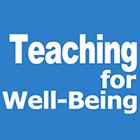Learning and Teaching For Wellbeing | About Faculty
 College brochures typically display images of happy, healthy students in diverse clusters of smiling faces. But that upbeat image does not reflect the reality for many young adults in higher education. Stress, anxiety, exhaustion, depression, and loneliness are all at record levels and continuing to rise each year. For university educators to remain effective, we must recognize the challenges that are affecting their academic performance. The purpose of this set of resources is to deepen educators' knowledge, strengthen their motivations and enrich their skills to support learners' wellbeing and benefit their personal and academic success.
College brochures typically display images of happy, healthy students in diverse clusters of smiling faces. But that upbeat image does not reflect the reality for many young adults in higher education. Stress, anxiety, exhaustion, depression, and loneliness are all at record levels and continuing to rise each year. For university educators to remain effective, we must recognize the challenges that are affecting their academic performance. The purpose of this set of resources is to deepen educators' knowledge, strengthen their motivations and enrich their skills to support learners' wellbeing and benefit their personal and academic success.
HOME | About students | about faculty | Instructional mETHODS | Resources | AllieS (COMiNG SOON)
What Do We Know About Our Faculty?
This page provides links to data from several sources that illuminate the challenges that faculty face about wellbeing -- their own and their students'. This information can help motivate faculty to recognize the importance of becoming better informed and better prepared to support students' wellbeing while enhancing their own wellbeing.
Role of Faculty in Student Mental Health
Boston University School of Public Health
In January 2021, in the middle of the pandemic year, Boston University School of Public Health (BUSPH) partnered with the Mary Christie Foundation (MCF) and the Healthy Minds Network (HMN) to pilot a survey aimed at understanding faculty members’ perspectives on the current state of student mental and behavioral health. The survey involved 1,685 faculty at 12 colleges and universities across the United States.
The findings include data on faculty observations of students' mental health issues, how often faculty have conversations with their students about mental health, faculty's perceptions of being unprepared to be effective supporters and a strong desire for more professional development in this area. They indicate that universities can do a better job in supporting faculty as they fulfill this increasingly important role in addressing the mental health of all students on campus.
"Role of Faculty in Student Mental Health Report" (pdf)
"Faculty: ‘Gatekeepers’ of Student Mental Health?" (Inside Higher Ed article, April 8, 2021)
On the Verge of Burnout: COVID-19’s impact on faculty wellbeing and career plans
Chronicle of Higher Education Report
The Chronicle of Higher Education conducted a survey in October, 2020, of 1,122 faculty members at four-year and two-year institutions around the nation. The 22-page report includes findings about levels of stress, thoughts about career changes, work-life balance issues, differential impacts of COVID on male and female faculty, and institutional responses.
“On the Verge of Burnout” (pdf)
Faculty open up about mental health under the COVID-19 pandemic
Chemical and Engineering News | May 17, 2020
An article from a disciplinary perspective on COVID-19 challenges as well as other sources of distress, which may also apply to faculty in many other disciplines as well.
"Faculty Open Up About Mental Health" (online)
Faculty at Risk: Colleges Can Support Faculty Mental Health During Stressful Times
Insight into Diversity | November 17, 2020
While much of the attention regarding mental health in higher education has been focused on students, colleges and universities should recognize that the pandemic has also created unprecedented personal and professional hardships for teaching staff.
"Faculty At Risk" (online)
Mental Health In Academia
Elife Sciences
How can the scientific community support researchers with mental health issues? This series of articles explores avenues for change and gives a voice to those on the front lines such as PIs, early-career researchers and non-academic staff.
"Mental Health In Academia" (online)
Faculty Pandemic Stress Is Now Chronic
INSIDE higher ed | NOVEMBER 19, 2020
COVID-19-related changes to teaching and dealing with students' mental health continue to weigh on professors, with implications for their own mental health.
"Faculty Pandemic Stress Is Now Chronic" (online)



